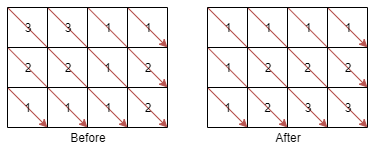1329. Sort the Matrix Diagonally
A matrix diagonal is a diagonal line of cells starting from some cell in either the topmost row or leftmost column and going in the bottom-right direction until reaching the matrix’s end. For example, the matrix diagonal starting from mat[2][0], where mat is a 6 x 3 matrix, includes cells mat[2][0], mat[3][1], and mat[4][2].
Given an m x n matrix mat of integers, sort each matrix diagonal in ascending order and return the resulting matrix.
Example 1:
Input: mat = [[3,3,1,1],[2,2,1,2],[1,1,1,2]]
Output: [[1,1,1,1],[1,2,2,2],[1,2,3,3]]

Example 2:
Input: mat = [[11,25,66,1,69,7],[23,55,17,45,15,52],[75,31,36,44,58,8],[22,27,33,25,68,4],[84,28,14,11,5,50]]
Output: [[5,17,4,1,52,7],[11,11,25,45,8,69],[14,23,25,44,58,15],[22,27,31,36,50,66],[84,28,75,33,55,68]]
Constraints:
- m == mat.length
- n == mat[i].length
- 1 <= m, n <= 100
- 1 <= mat[i][j] <= 100
Solution
class Solution {
/**
[[1,1,1,1],
[1,2,2,2],
[1,2,3,3]]
[[11,25,45,1,69,7],
[23,36,17,58,8,52],
[75,31,55,44,66,15],
[22,27,33,25,68,4],
[84,28,14,11,5,50]]
[22,27,31,36,50,66],
[84,28,75,33,55,68]]
*/
public int[][] diagonalSort(int[][] mat) {
int rows = mat.length;
int cols = mat[0].length;
for (int i = 0; i < rows; i++) {
sort(i, 0, mat);
}
for (int j = 0; j < cols; j++) {
sort(0, j, mat);
}
return mat;
}
void sort(int row, int col, int[][] mat) {
int rows = mat.length;
int cols = mat[0].length;
int[] freq = new int[101];
int i = row;
int j = col;
while (i < rows && j < cols) {
int val = mat[i][j];
freq[val]++;
i++;
j++;
}
i = row;
j = col;
int k = 0;
int index = 0;
while (i < rows && j < cols) {
while (freq[index] == 0) {
index++;
}
mat[i][j] = index;
freq[index]--;
i++;
j++;
k++;
}
}
void sort2(int row, int col, int[][] mat) {
int rows = mat.length;
int cols = mat[0].length;
List<Integer> diagonal = new ArrayList<>();
int i = row;
int j = col;
while (i < rows && j < cols) {
diagonal.add(mat[i][j]);
i++;
j++;
}
Collections.sort(diagonal);
i = row;
j = col;
int k = 0;
while (k < diagonal.size()) {
mat[i][j] = diagonal.get(k);
i++;
j++;
k++;
}
}
}